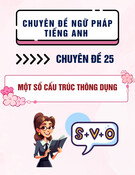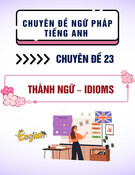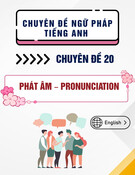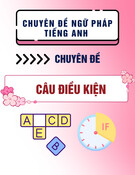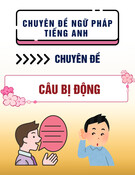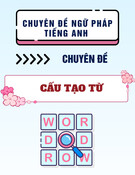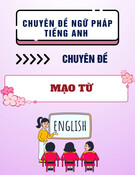
Hue University Journal of Science: Social Sciences and Humanities
ISSN 2588-1213
Vol. 133, No. 6B, 2024, p.p. 65–80, DOI: 10.26459/hueunijssh.v133i6B.7267
TEACHING INTERCULTURAL COMMUNICATIVE
COMPETENCE IN ENGLISH FOR TOURISM CLASSES IN
VIETNAM: TEACHERS’ PRACTICES AND PERCEPTIONS
Trần Thị Thu Trang *
University of Foreign Languages and International Studies, Hue University, 57 Nguyen Khoa
Chiem St., Hue, Vietnam
* Correspondence to Tran Thi Thu Trang < trangttt@ntu.edu.vn >
(Received: August 01, 2023; Accepted: March 05, 2024)
Abstract. The study explores Vietnamese EFL teachers’ practices and beliefs about intercultural
communicative competence (ICC) for tourism majors. Fifteen observations were conducted in their
English for Tourism Purposes (ETP) classes at three institutes in Central Vietnam. The teachers were then
interviewed in a semi-structured format to examine the beliefs underlying their ICC teaching practices.
The findings showed that the teacher’s practices focused on language skills and tourism-related
knowledge. Their teaching of ICC was treated as a minor goal, but when they taught ICC, they
emphasized the linguistic, cognitive and behavioural facets over others. Their practices were led by their
beliefs in the importance of preparing students for their course assessment and future occupations. The
study provides essential implications for ICC education in the tourism domain.
Keywords. Teachers’ practices, beliefs, intercultural communicative competence, English for tourism.
1. Introduction
The ability to communicate appropriately in various cultural contexts is an indispensable
condition that enables people to live together in the current era of globalization [16]. With
exponential growth of hotel and hospitality industry, tourism has become a more and more
culturally diverse business [17]. It is a fundamental precondition for tourism employees and
tourism-majored students who will work in an intercultural environment to negotiate cultural
differences for efficient communication [27]. Intercultural communicative competence (ICC) is
considered to be a crucial competence to succeed in communication in international contexts [3].
ICC is described as “the ability to communicate effectively and appropriately in intercultural
situations” [9, pp. 247-248]. With good ICC, people from different cultural backgrounds can
interact smoothly and avoid communication barriers that frequently originate from cultural
misunderstandings. ICC also helps graduates of tourism majors confidently integrate and assert

Trần Thị Thu Trang Vol. 133, No. 6B, 202
4
66
themselves in a professional international environment with high salaries, good remuneration,
and outstanding promotion potential [31]. Consequently, there is a fact that teaching English in
general and teaching English for Tourism Purposes in particular requires not only teaching
learners the ability to use the English language fluently but also helping them to obtain ICC.
Furthermore, Byram [6] urges us to pay greater attention to the integrated function that
instructors play as both linguistic and intercultural educators rather than only concentrating on
the job of teaching language in English language instruction. As such is the importance of
teaching and learning ICC, numerous studies on ICC have been implemented by many scholars
[2, 17, 20, 32, etc.]. More and more educators have also called for more attention to the
development of ICC for EFL learners [11, 23].
Although many studies related to ICC have been conducted in EFL teaching and
learning contexts [2, 11, 19, 20, 22, 32], few explore teachers’ ICC practices [25] and/or their
beliefs [14], especially in the tourism industry [30]. To the best of our knowledge, there is scant
research on teachers’ practices of ICC and their beliefs in the tourism field at the tertiary level in
the Vietnamese context. This study addresses these gaps by investigating the ETP teachers’
practices of ICC and the beliefs underlying their teaching in Vietnamese tertiary settings with
the hope of contributing to existing knowledge about ICC education in the tourism field.
2. Literature review
2.1 Intercultural communicative competence (ICC) and Byram’s model of ICC
ICC is considered to be a fundamental notion in language and intercultural
communication [15]. It is known as “knowledge, motivation, and skills needed to interact
effectively and appropriately with members of different cultures” [26, p. 208]. Noticeably, in the
realm of foreign language education, Byram [5, pp. 48-73] defines ICC as the “individual’s
ability to interact with people from another country and culture in a foreign language by acting
as a mediator between people of different cultural origins”. According to Byram [5, 6],
intercultural competence (IC) consists of five components: Knowledge (savoirs), Skills of
interpreting and relating (savoir comprendre), Skills of discovery and interaction (savoir
apprendre/faire), Critical cultural awareness (savoir s’engager), and Attitudes (savoir être). Byram
[cited in 12, p. 65] explained that these five competences can be summarized into three groups:
affective capacities/attitudes, i.e. sensitivity of the other “cultural identities, respect for otherness,
tolerance for ambiguity and empathy”, behavioural capacity, which means self-adjusting in order
to talk/write appropriately in intercultural settings, and cognitive capacity comprising
“knowledge, knowledge discovery, interpreting and relating, and critical cultural awareness”.
In the particular field of tourism, Yu et al. [29] recommend the IC of tour guides which includes

Jos.hueuni.edu.vn
Vol. 132, No. 6B, 2023
67
the three dimensions of Byram’s ICC: affective, behavioural and cognitive. The affective
dimension in the tourism field, according to Yu et al. [29, pp. 80-81] means tourism personnel
need “to be empathetic, non-judgmental and sensitive” to tourists’ needs. Meanwhile, the
behavioural aspect refers to the staff’s “communication skills and interpersonal interaction”,
which means their ability to interact with customers and handle intercultural situations
properly. The cognitive component is defined as tourism staff’s knowledge and understanding
of their home countries’ and tourists’ cultures as well as the differences between the host’s and
guests’ cultures.
Byram [6] also develops a comprehensive model of ICC to include linguistic,
sociolinguistic, discourse and intercultural competences. In Byram’s model of ICC, the linguistic
competence means “the ability to apply the rules of a standard version of the language to
produce and interpret spoken and written language” [6, p. 60], while the sociolinguistic
competence refers to the capability to understand and negotiate the right meanings with the
interlocutor. Discourse competence is defined as being able to “use, discover and negotiate
strategies” to produce and interpret texts which are in line with an interlocutor’s cultural
conventions or negotiate “intercultural texts for particular purposes” [6, p. 60]. The value of
Byram’s ICC model is undeniable. First of all, it is the most specific, well-articulated model [18].
Secondly, it is one of the influential models of teaching and assessing ICC in language
education [22]. In other words, it is acknowledged as the cornerstone in the field [8]. For these
reasons, Byram’s ICC model was employed as a theoretical framework for the present study. It
has been used in many studies on ICC in a wide range of EFL and discipline-specific contexts
[21, 24].
2.2 Teaching ICC in ETP courses
Teaching ICC for ETP tourism students plays a vital role in the tourism undergraduates’
future careers, as they are trained to work with foreign colleagues and tourists from different
cultural backgrounds. Effective intercultural communication requires awareness of linguistic
and non-linguistic factors such as cultural barriers [1]. Hence, teaching English for tourism
majors demands not only equipping learners with the ability to use language fluently but also
helping them to acquire ICC. Although there has not been any practical guide for teaching ICC
specifically in the tourism field, general principles have been developed for teaching ICC in
language courses. These principles emphasise language and culture integration, learners’
engagement in real-life communication, a dynamic intercultural teaching approach and a focus
on developing learners’ ICC [18].

Trần Thị Thu Trang Vol. 133, No. 6B, 202
4
68
2.3 Related ICC studies
This part presents the research on teachers’ practices and their beliefs in teaching ICC in
general and specialized English classes respectively. For example, in a European context, Sercu
[22] conducted a quantitative study via questionnaires with 424 secondary school teachers of
English, German, French, and other languages from six European countries. The findings show
that the teachers focused on the learners’ acquisition of communicative competence in the
foreign language. In an Asian context, the studies from China [25, 32] investigated both the
teachers’ perceptions and their teaching practices of culture and ICC. Both of the studies
showed that the teachers perceived the significance of teaching culture/ICC in EFL classes;
however, their practices showed an irregular emphasis on cultural/intercultural language
teaching.
In a Vietnamese context, Ho [13] used a mixed-method research to investigate the
cultural content in the curriculum for tertiary EFL programmes, the perceptions and classroom
practices of fourteen EFL teachers, and the cultural learning of 200 EFL students. The findings
indicated that culture and culture learning was not emphasized in the EFL courses. In the same
context and investigating the teachers’ beliefs and integration of culture in EFL classes to
develop learners’ intercultural competence, Nguyen [19] gathered data from interviews,
classroom observations, field notes and teaching materials with the participation of 15 tertiary
English teachers. The results showed that the participants aimed at restricted objectives in
cultural teaching and focused on teaching cultural knowledge rather than intercultural skills
and awareness. Focusing on the Business course, Ho and Ton [14] conducted a case study with
six Business English teachers in a college in Vietnam to explore their perceptions and practices
of ICC in Business English teaching. The research showed that the teachers prioritized language
competence over ICC, and their ICC teaching concentrated on intercultural knowledge. In the
tourism context, Y. Liu, J. Liu, and King [17] examined the perceptions of the faculty, students
and experts related to ICC using 361 questionnaires collected from 13 universities and 21 hotels
in China. The findings show that all interviewees perceived that more attention should be paid
to language than behavioural and affective dimensions of ICC.
The prior studies reviewed here have focused on teachers’ practices and/or perceptions in
general EFL classes, except for two studies in the ESP domain [14, 17]. ICC teaching in ETP
courses and teachers’ beliefs are still limited. As ICC is a core competence to develop for
tourism staff [3], understanding how teachers teach ICC for their tourism students and their
underlying beliefs is important in planning ICC instruction for this group. This study thus
investigated how Vietnamese EFL teachers addressed ICC in their ETP classes and what they
believed guided their ICC teaching practices. The current study aims to answer these two

Jos.hueuni.edu.vn
Vol. 132, No. 6B, 2023
69
research questions:
(i) How do Vietnamese EFL teachers address ICC in ETP classes?
(ii) Why do they address ICC in these particular ways?
3. Methods
3.1 Participants
Ten teachers who taught ETP at one junior college and two universities in a city in central
Vietnam which is popular with tourists voluntarily participated in this research. The teachers
were selected purposefully based on three criteria: (i) teaching ETP courses for at least five years
so that they had sufficient experience, (ii) being willing to be observed, and (iii) voluntarily
participating in a subsequent interview. They were all female, aged from 30 to 46 with an M.A.
degree in Applied Linguistics/TESOL except one with a doctoral degree. They had from five to
18 years of experience in teaching English for tourism majors.
3.2 Data collection
Firstly, classroom observations were used to examine the Vietnamese ETP teachers’
practices of ICC in their English classrooms, as it helps gather “live data” from naturally
occurring social situations [7, p. 396]. On the basis of the availability of classes for observation,
five teachers were observed twice and the other five teachers were observed once as they taught
in their normal classroom hours in May 2022. In total, there were fifteen classroom observations
targeting teaching English for hotel and restaurant management, and English for tour guide and
tour operation. Each classroom observation lasted about 50 minutes and was audio-recorded
with the teachers’ permission. In total, there were 12 hours five minutes of classroom
observation made to ten teachers. To ensure reliability, every lesson was observed using a
systematic observation scheme [adapted from 14]. Every lesson was observed using a
structured observation plan based on the same standards to ensure reliability including
teaching activities, teaching contents, teaching cultural/ICC activities, and field notes. All the
notes were manually taken on the classroom observation scheme. Instead of concentrating only
on the ICC teaching practices, all of the teaching activities were recorded chronologically in
order to reduce the researcher’s personal bias on the observed data. The data from the audio
recordings was used as an additional source of data.
Secondly, interviews were additionally used to explore the Vietnamese ETP teachers’
beliefs underlying their ICC teaching. The interview is “a useful tool to collect data” flexibly [7,
p. 409). The ten Vietnamese ETP teachers, whose classes were observed, voluntarily participated

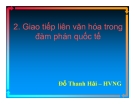


![Giao Tiếp Tiếng Anh: Nghệ Thuật và Kỹ Năng [Chuẩn Nhất]](https://cdn.tailieu.vn/images/document/thumbnail/2013/20130624/stylegau/135x160/9811372056469.jpg)



![Các hình thức rút gọn trong giao tiếp tiếng Anh [chuẩn nhất]](https://cdn.tailieu.vn/images/document/thumbnail/2013/20130613/hetmuonnoi/135x160/4421371118085.jpg)



![Bài giảng Văn học phương Tây và Mỹ Latinh [Tập hợp]](https://cdn.tailieu.vn/images/document/thumbnail/2025/20251003/kimphuong1001/135x160/31341759476045.jpg)
